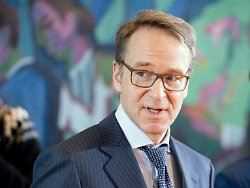Sunday, August 8th, 2021
Interest rate swing when there is a risk of inflation
Weidmann warns debt makers in the eurozone
Bundesbank President Weidmann is preparing the euro countries for a tighter monetary policy by the central bank. If the inflation rate accelerates in the euro zone, the ECB will have to raise interest rates. She could then not take into account the financing costs of the states.
Bundesbank President Jens Weidmann has warned the member states of the euro area against relying on the support of the European Central Bank to finance their growing national debts. “The ECB is not there to take care of the solvency security of the states,” Weidmann told the “Welt am Sonntag”.
If the inflation outlook should rise sustainably, the ECB would have to tighten monetary policy. “We can then take no account of the financing costs of the states,” said Weidmann.
The current inflation rate of 3.8 percent in Germany is currently driven by temporary special factors and will then normalize again, the Bundesbank chief said. In the long term, however, he anticipates that inflation will accelerate in the entire euro area.
The euro watchdogs would have to make it clear again and again that monetary policy would be tightened if the price outlook required it, said Weidmann. “We can then take no account of the financing costs of the states.” He pointed out the risk of unsound public finances. Monetary policy should therefore not get caught up in fiscal policy.
Emergency purchase program PEPP – “P does not stand for permanent”
“We have to watch carefully whether the price pressure is actually weakening as expected in our forecasts. I also do not consider higher inflation rates to be ruled out,” he said and emphasized: “In any case, I will insist that the risk of an excessively high inflation rate be precisely identified to keep an eye on and not just look at the risk of an inflation rate that is too low. “
After the summer break, the governing council will discuss the modalities of the bond purchase programs. Weidmann made it clear where he sees the limits of this monetary aid: “The emergency purchase program PEPP must be ended when the crisis is over. The first P ultimately stands for pandemic and not for permanent,” he said. “It’s a question of credibility.” The APP purchasing program cannot be continued indefinitely either. “We will also stop that as soon as the price outlook shows it,” said Weidmann.
.
